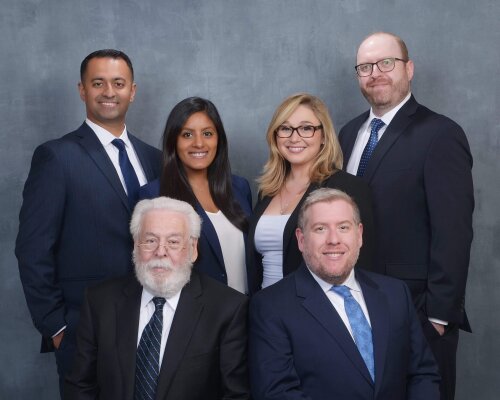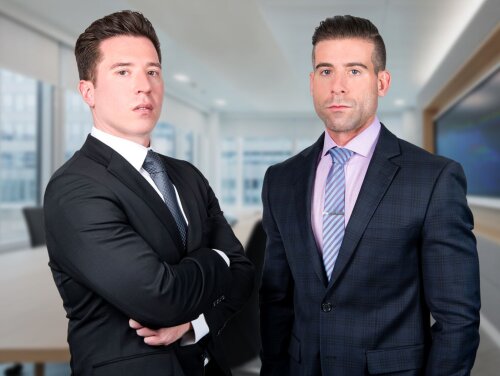Best Ethics and Professional Responsibility Lawyers in Philadelphia
Share your needs with us, get contacted by law firms.
Free. Takes 2 min.
List of the best lawyers in Philadelphia, United States
About Ethics and Professional Responsibility Law in Philadelphia, United States:
Ethics and professional responsibility law governs the conduct of lawyers, judges, and many public officials. In Philadelphia, these rules come from multiple sources - the Pennsylvania Rules of Professional Conduct that apply to lawyers licensed in Pennsylvania, local court rules, advisory opinions from bar committees, and city-level ethics rules that apply to municipal officials and employees. The rules set standards for duties such as confidentiality, competence, conflict avoidance, candor to tribunals, proper handling of client funds, and fair advertising. When alleged breaches occur, the matter can lead to internal discipline, formal complaints to disciplinary bodies, civil malpractice suits, or municipal enforcement for public officials. Understanding the system and your rights early improves the chance of an effective outcome.
Why You May Need a Lawyer:
Ethics and professional responsibility matters can be complex and consequential. You may need a lawyer in situations including:
- You are the subject of a disciplinary complaint alleging misconduct as an attorney or judge and you need representation before investigatory or disciplinary bodies.
- You believe your lawyer committed malpractice, mishandled funds, missed deadlines, or breached ethical duties and you want to explore civil remedies or fee arbitration.
- You are a lawyer facing a conflict of interest question, uncertainty about withdrawal, client confidentiality issues, or multi-jurisdictional practice issues and you want preventive guidance.
- You are a client or third party who suspects a lawyer engaged in fraud, deceptive advertising, or solicitation in violation of professional rules.
- You are a public official, candidate, or city employee dealing with Philadelphia Board of Ethics inquiries, gift or post-employment rules, or disclosure obligations.
- You need to request an advisory opinion on an ethics question or seek counsel about limits on speech, campaign activity, or lobbying in a municipal or state setting.
Local Laws Overview:
Key aspects of the local legal framework that affect ethics and professional responsibility in Philadelphia include:
- Pennsylvania Rules of Professional Conduct - These are the primary rules for lawyers licensed in Pennsylvania. They address confidentiality, conflicts of interest, competence, communication with clients, fees, advertising, solicitation, and duties to courts and third parties. Many local disciplinary decisions interpret these rules in practice.
- Disciplinary enforcement - Complaints against lawyers are investigated by the Office of Disciplinary Counsel and adjudicated by the Disciplinary Board of the Supreme Court of Pennsylvania. Outcomes can range from dismissal to reprimand, suspension, or disbarment.
- Municipal ethics - Philadelphia has a Board of Ethics that administers the city ethics code for elected officials and city employees. The code covers conflicts, gifts, financial disclosure, outside employment, and campaign conduct for city actors.
- Judicial conduct - Judges in Pennsylvania are subject to separate standards and oversight through the Judicial Conduct Board of Pennsylvania, which investigates allegations of judicial misconduct and can recommend sanctions to the state Supreme Court.
- Fee dispute mechanisms - The Philadelphia Bar Association and some courts offer fee arbitration and mediation programs to resolve lawyer-client fee disputes without full litigation.
- Public corruption and criminal law interface - Serious ethics breaches that involve fraud, embezzlement, bribery, or other criminal acts may trigger criminal investigations led by local district attorneys or federal prosecutors in addition to professional discipline.
Frequently Asked Questions:
What should I do if I receive a notice that a disciplinary complaint has been filed against me as an attorney?
Do not ignore the notice. Read it carefully to understand the allegations and the deadlines. Preserve all relevant files and communications, retain counsel experienced in disciplinary defense, and respond to requests promptly. Early counsel can help present mitigating facts, negotiate stipulations, or limit exposure.
How do I file a complaint about an attorney in Philadelphia?
If you believe an attorney violated ethical rules, you can file a complaint with the appropriate disciplinary authority. Be prepared to provide a clear, factual account, copies of documents, and contact information. The disciplinary office will screen the complaint and determine whether an investigation is warranted.
Can I sue my lawyer for malpractice and what remedies are available?
Yes, clients may bring civil claims for legal malpractice when an attorney fails to exercise reasonable skill or care and that failure causes measurable harm. Remedies can include damages for financial loss and, in some cases, contractual relief. Malpractice cases are fact-specific and subject to filing deadlines, so timely consultation with a malpractice attorney is important.
What protections exist for attorney-client communications in Pennsylvania?
Attorney-client privilege and confidentiality rules protect many communications between lawyers and clients. The privilege generally covers confidential communications made for the purpose of legal advice. There are exceptions, such as when communications are used to further a crime or fraud. The Rules of Professional Conduct also require lawyers to protect client confidences.
What happens if a lawyer mishandles client funds?
Mishandling client funds is a serious ethical violation. Consequences can include disciplinary action, restitution orders, and criminal charges in severe cases. Lawyers must follow strict trust accounting rules, and clients or third parties may pursue civil remedies or file complaints with disciplinary authorities.
How does Philadelphia handle ethics for city officials and employees?
Philadelphia enforces its municipal ethics code through the city Board of Ethics. The code regulates conflicts of interest, gifts, outside employment, financial disclosures, and political activity for city officials and employees. The Board issues advisory opinions, investigates complaints, and can recommend corrective action or penalties under city rules.
What should I do if I learn another lawyer is engaging in misconduct?
Under the Rules of Professional Conduct, lawyers may have an obligation to report certain professional misconduct by other lawyers. If you suspect serious misconduct, consult the applicable reporting rules and consider contacting disciplinary authorities. If you are unsure, seek guidance from a trusted ethics counsel or bar committee.
Can a disciplinary finding be appealed?
Yes, disciplinary decisions often include appellate processes. The specific path depends on the forum and the disciplinary rules involved. Appeals can raise issues of procedure, factual sufficiency, or legal interpretation. An appellate or disciplinary specialist should handle such appeals.
How do fee arbitration and mediation work for fee disputes?
Many local bar associations and courts offer fee arbitration and mediation as alternatives to litigation. These programs allow a neutral arbitrator or mediator to review the fee arrangement, hear both sides, and issue a binding or non-binding decision. They are typically faster and less costly than suing for fees.
Where can I get an ethics opinion if I am unsure about a proposed action?
Lawyers can seek advisory opinions from bar association ethics committees, in-house counsel, or retained ethics specialists. Philadelphia and Pennsylvania bar groups provide formal and informal opinion services that can reduce the risk of future disciplinary problems. For public officials, municipal ethics boards also issue advisory opinions on city-specific questions.
Additional Resources:
These local and state organizations can provide information, guidance, or formal processes related to ethics and professional responsibility:
- Disciplinary Board of the Supreme Court of Pennsylvania
- Office of Disciplinary Counsel for Pennsylvania
- Philadelphia Board of Ethics
- Philadelphia Bar Association - Committee on Professional Responsibility and Fee Arbitration Program
- Pennsylvania Bar Association - Ethics and Professional Responsibility resources
- Judicial Conduct Board of Pennsylvania
- Local law school clinics and legal aid organizations for low-cost or pro bono assistance, including university law clinics in Philadelphia
- Philadelphia Office of the District Attorney for matters that may involve criminal conduct
Next Steps:
If you need help with an ethics or professional responsibility issue, consider these practical steps:
- Gather documentation - Collect engagement letters, billing records, email and text communications, court filings, and any relevant evidence. Organized records will help your lawyer evaluate the matter quickly.
- Seek a confidential consultation - Contact an attorney experienced in ethics or disciplinary defense as soon as possible. Many lawyers and bar associations offer initial consultations or referrals.
- Consider informal resolution - For fee disputes or misunderstandings, mediation or fee arbitration can be an efficient option. Discuss this with your lawyer or the local bar association.
- Protect urgent rights - If deadlines may apply, such as statutes of limitation for malpractice claims or filing responses to disciplinary notices, act promptly to preserve your rights.
- Ask about costs and strategy - Ethical matters can involve both regulatory processes and civil litigation. Discuss likely outcomes, timelines, and fee structures with any lawyer you consult.
- Use advisory resources - When appropriate, request advisory opinions from bar committees or the municipal Board of Ethics to reduce risk before taking action.
Handling ethics and professional responsibility issues carefully and promptly improves the chances of a favorable result. If you are uncertain where to begin, reach out to a qualified local attorney or the Philadelphia Bar Association for a referral and next-step guidance.
Lawzana helps you find the best lawyers and law firms in Philadelphia through a curated and pre-screened list of qualified legal professionals. Our platform offers rankings and detailed profiles of attorneys and law firms, allowing you to compare based on practice areas, including Ethics and Professional Responsibility, experience, and client feedback.
Each profile includes a description of the firm's areas of practice, client reviews, team members and partners, year of establishment, spoken languages, office locations, contact information, social media presence, and any published articles or resources. Most firms on our platform speak English and are experienced in both local and international legal matters.
Get a quote from top-rated law firms in Philadelphia, United States — quickly, securely, and without unnecessary hassle.
Disclaimer:
The information provided on this page is for general informational purposes only and does not constitute legal advice. While we strive to ensure the accuracy and relevance of the content, legal information may change over time, and interpretations of the law can vary. You should always consult with a qualified legal professional for advice specific to your situation.
We disclaim all liability for actions taken or not taken based on the content of this page. If you believe any information is incorrect or outdated, please contact us, and we will review and update it where appropriate.










